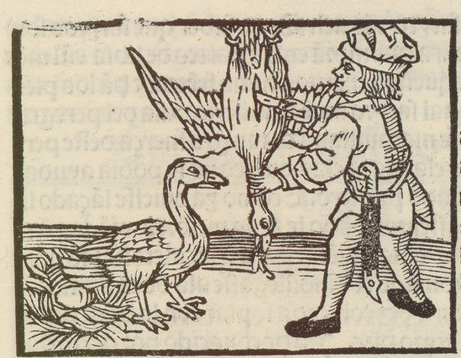HODIE: pridie Kalendas Maias. You can add a Roman calendar as a widget in your blog or webpage, or display it as a Google Calendar: here's how.
MORE FABLES: Here are today's fables from the Ictibus Felicibus project. These fables ALL have long marks, plus stress marks for easy reading, and the poems have meter marks, too, along with an easy-to-read prose presentation of the story:
- Galli Inter Se Pugnantes, the story of a long-running rivalry between two fighting roosters.
- Asinus, Simia et Talpa, the three creatures compare their complaints about life.
- Abbas, Monchaus et Ossa, the story of how a monk learns wisdom from the bones in an ossuary.
- Leo, Asinus et Lepus, how the lion made good use of both the donkey and the rabbit in his army.
- Eruditus et Troffulus, the story of a wise scholar and his annoying neighbor.
Quīdam voluit claustrālem vītam dūcere. Dīxit Abbās: Laudēs haec ossa et benedīcās, dēmōnstrātō acervō ossium mortuōrum. Laudāvit igitur et benedīxit. Quō factō, ait Abbās: Benedīxistī ossibus? Rēspondit: Benedīxī. Quaerēbat Abbās: Quid rēspondērunt? Dīxit Iuvenis: Nihil. Iterum Abbās: Maledīcās et vituperēs. Quī sīc fēcit quantum potuit. Et ait Abbās: Maledīxistī? Et ait Iuvenis: Maledīxī. Et quaesīvit Abbās: Quid rēspondērunt? Et ait Iuvenis: Nihil. Ait Abbās: Frāter, tālem tē oportet esse ut, sī vērus monachus vīs fīerī, ita benedictiōnibus et maledictiōnibus nihil rēspondeās.TODAY'S MOTTOES & PROVERBS: You can get access to ALL the "proverb of the day scripts" (also available as random proverb scripts) at the SchoolhouseWidgets.com website.
Tiny Mottoes: Today's tiny motto is: Sursum (English: Upwards - a great one-word proverb).
3-Word Proverbs Verb-less: Today's 3-word verb-less proverb is Facilia sapientibus cuncta (English: For the wise, all things are easy)
Audio Latin Proverb: Today's audio Latin proverb is Est unusquisque faber ipsae suae fortunae (English: Each and every person is the maker of his own luck). To read a brief essay about this proverb and to listen to the audio, visit the Latin Via Proverbs blog.
Maxims of Publilius Syrus: Today's proverb from Publilius Syrus is: Stultum est queri de adversis, ubi culpa est tua (English: It's stupid to complain about difficulties when the fault is yours).
Animal Proverb from Erasmus: Today's animal proverb from Erasmus is Camelus desiderans cornua, etiam aures perdidit (English: Hoping for horns, the camel lost its ears, too; from Adagia 3.5.8 - an allusion to the Aesop's fable about the overly ambitious camel).
For an image today, here is an illustration for the story of the lion, the donkey and the rabbit, Leo, Asinus et Lepus:


































